Unit 2 Poems using language
文档属性
| 名称 | Unit 2 Poems using language | 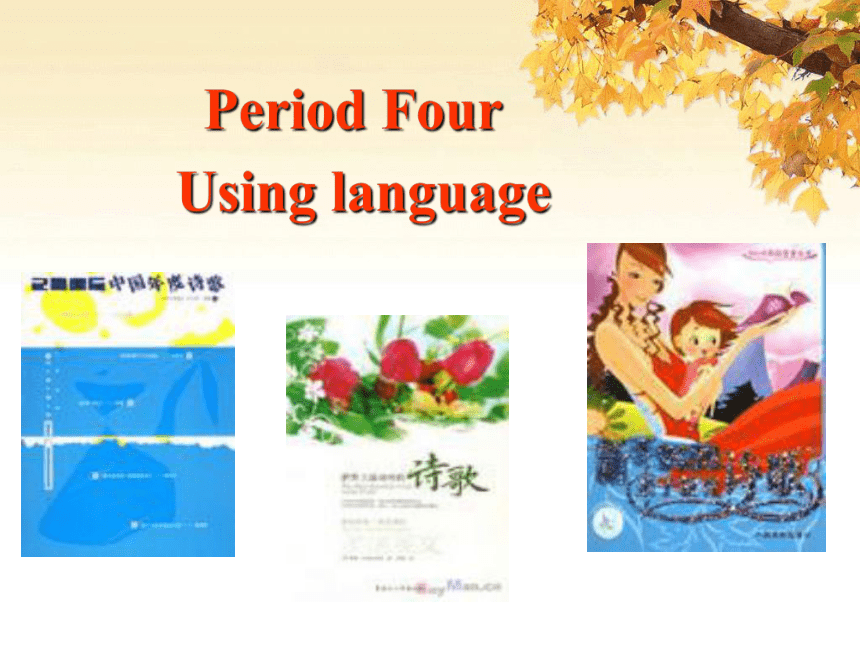 | |
| 格式 | rar | ||
| 文件大小 | 671.6KB | ||
| 资源类型 | 教案 | ||
| 版本资源 | 人教版(新课程标准) | ||
| 科目 | 英语 | ||
| 更新时间 | 2010-03-10 20:45:00 | ||
图片预览

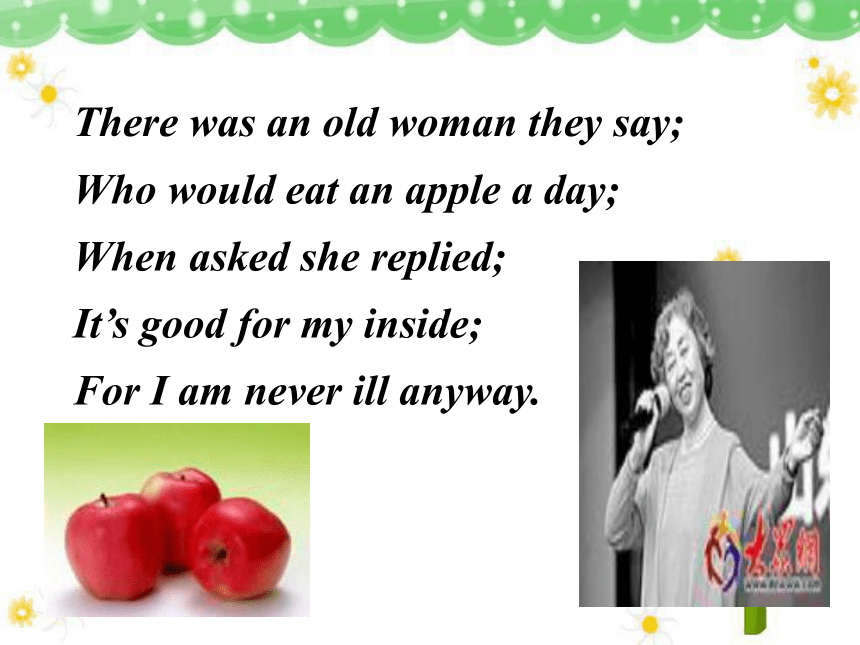
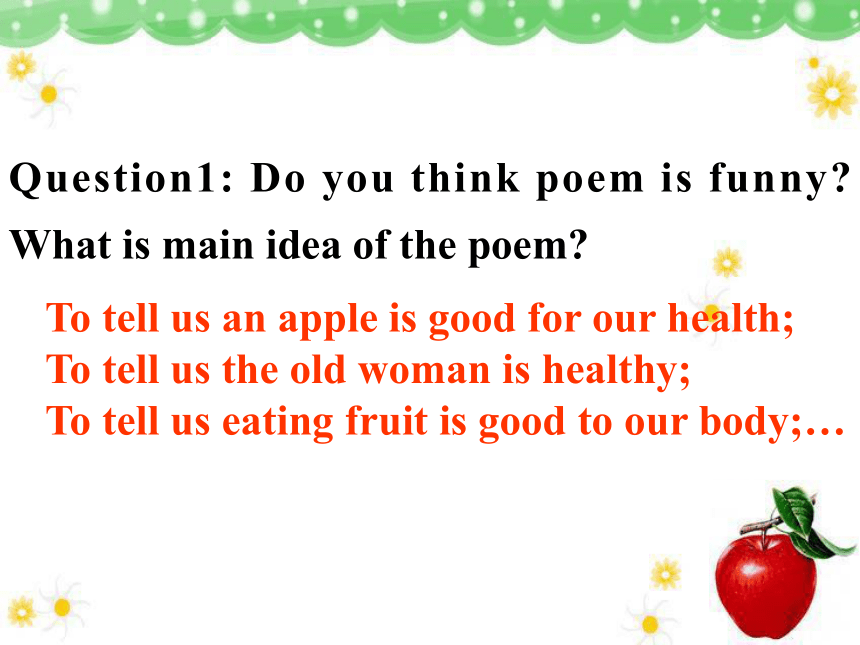
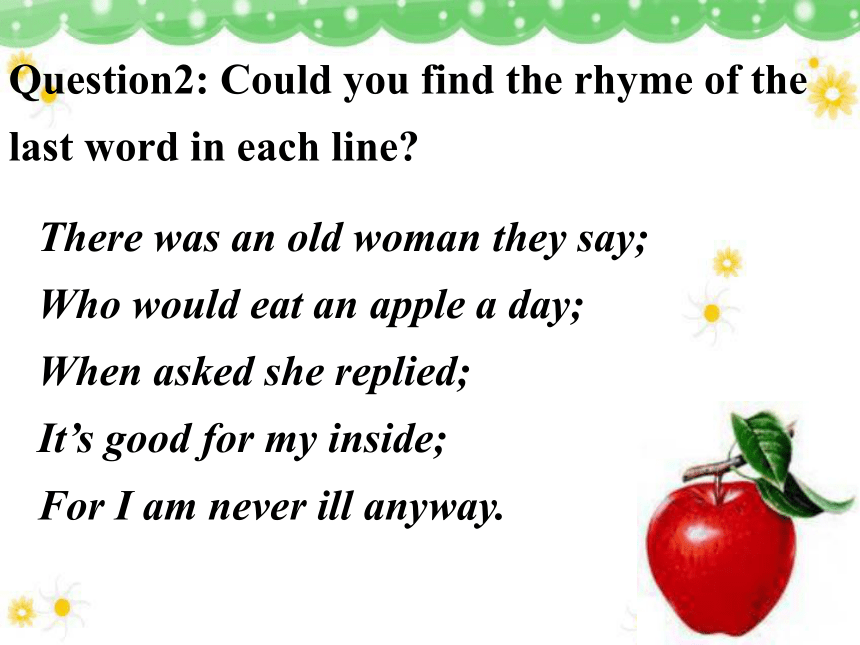
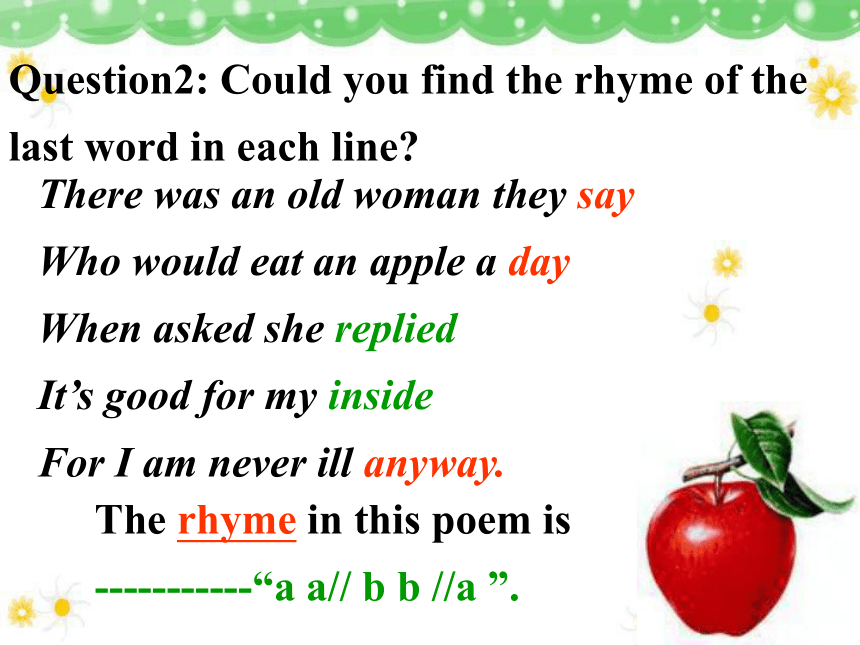

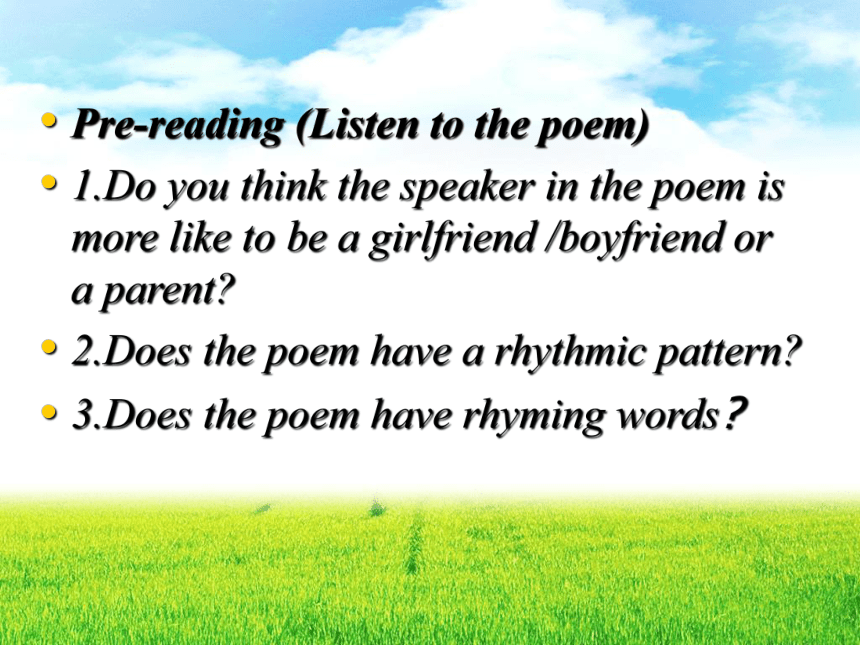
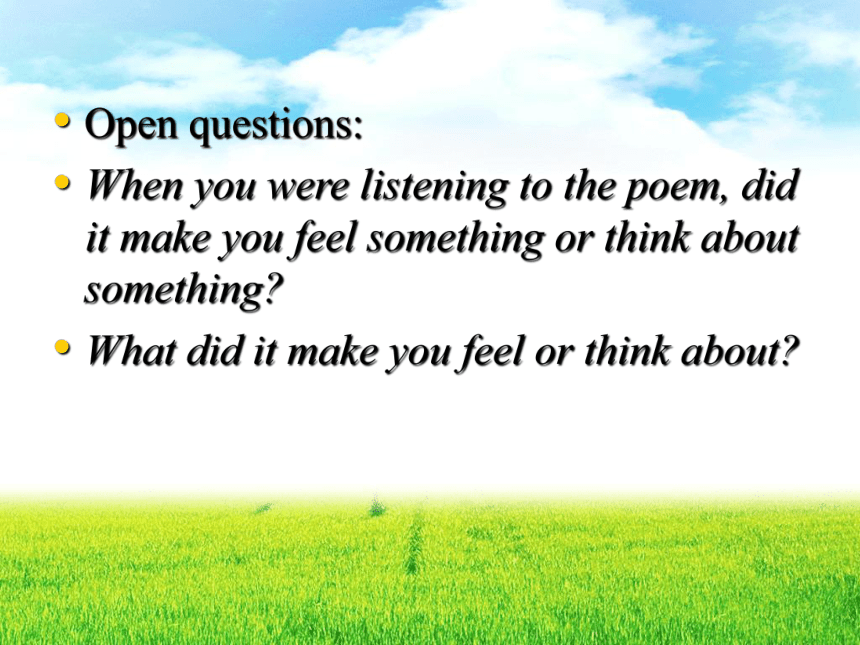
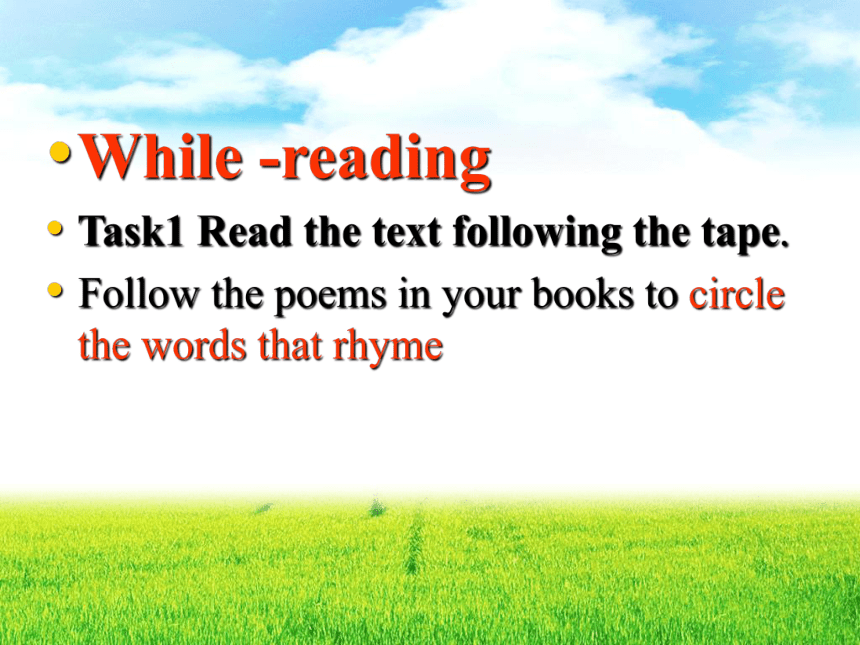
文档简介
课件23张PPT。 Period Four
Using languageThere was an old woman they say;
Who would eat an apple a day;
When asked she replied;
It’s good for my inside;
For I am never ill anyway.
Question1: Do you think poem is funny? What is main idea of the poem?
To tell us an apple is good for our health;
To tell us the old woman is healthy;
To tell us eating fruit is good to our body;…Question2: Could you find the rhyme of the last word in each line?
There was an old woman they say;
Who would eat an apple a day;
When asked she replied;
It’s good for my inside;
For I am never ill anyway.There was an old woman they say;
Who would eat an apple a day;
When asked she replied;
It’s good for my inside;
For I am never ill anyway.Question2: Could you find the rhyme of the last word in each line?
The rhyme in this poem is
-----------“a a// b b //a ”.
I’VE
SAVE
THE
SUMMERPre-reading (Listen to the poem)
1.Do you think the speaker in the poem is more like to be a girlfriend /boyfriend or a parent?
2.Does the poem have a rhythmic pattern?
3.Does the poem have rhyming words?Open questions:
When you were listening to the poem, did it make you feel something or think about something?
What did it make you feel or think about?While -reading
Task1 Read the text following the tape.
Follow the poems in your books to circle the words that rhymeTask2 Clap the strong beats of the rhythmPost –reading
Question1:
Who is the speaker in the poem and who is he/she speaking to?
Give some reasons to support your answer.A parent (mother or father) is speaking to a young adult child (son or daughter).
Many of the phrases imply that the speaker is an older person who has experienced their own journey through life and who is offering love to the young person to help him/her begin on his/he own journey through life. For example, I’ve saved the summer… I’ve saved some sunlight… When the speaker says Till you’re older… he/she is implying that he/she is much older than the young person (that is, till you’re older like me). The parent also says that although he/she is older, he/she does not know the answers to life’s questions (I know no answers to help you on your way).We know that the speaker is probably a parent because
he/she is offering the child unconditional love (But if
you’ve a need for love, I’ll give you all I won). We know
that the son/daughter is a young adult because the
speaker refers to the time when you were but nineteen.Question2: Which of the following is the closest to the speaker’s message? Give a reason for your choice.
A .If it’s cold, I’ll warm you; if it’s dark, I’ll give you light; if you’re hungry, I’ll feed you; if you want love, I’ll give it to you.
B. Although the future may be difficult for you, whenever you need warmth and love, remember I’ll have some to give you.
C. While you’re away I’ll remember your smile and I’ll love you always. When you return, I hope you will love me. Pre-listening
What inspires you to write poetry?
In what kind of place do you like to write poetry?
What conditions do you need to be able to write poetry? ( Does it have to be quite ,do you need to be alone, do you need to listen to music and so on?)Main idea:
The listening is a conversation between a teacher
and three of her students about a poetry competition.
The students talk about when they are going to write
their poems and how they become inspired to write
poetry.First listening (Do some listening exercises)
1. Who has written a poem already and is ready to enter the competition?
A. Lucy B. Jack C. Pitt
2. Who is not going to enter a poem for the competition this year?
A. Lucy B. Jack C. Pitt
3. Who plans to write at the weekend?
A. Lucy B. Jack C. Pitt
4. When is the deadline for the competition?
By the 23th of the month
By the 24th of the month
By the 20th of the month
Listen to Part2 of the tape and fill the chart.
Jack: By going for a hiking in the countryside
and sitting quietly by himself.
Lucy: By surrounding herself with familiar things
in her own house
Pitt.: By listening to his favorite music.Second ListeningThird Listeningnot going toplan to dowillintend toI’llI’m going tolooking forward to
Listen for a different kind of detail. Sentences are model ways of expressing intention.
Repeating and Practicing
Imagine that the class has to enter poems in a competition next week. In small groups discuss the question :How are you going to become inspired to write your poem?Writing
Task1.Revise the grammar
Write a list poem starting with If I like poem C on page 10.write one line each .It doesn’t have to rhyme
Sentences pattern:
If I were the ruler of the world, I would….
If I had a million dollars, I would…
If I had taken your advice, I would have/wouldn’t have…
Task2 Write a poem
Write a poem that starts with I feel happy when …..The lines do not have to rhyme .
Eg A:
I feel happy when…
The sky is blue,
You smile at me with your sparking black eyes,
It’s my birthday.
Write a poem that starts each line with Slowly… and make each pair of lines rhyme.
Eg B:
Slowly the moon climbs in the sky,
Slowly the black-tailed bird lets out a cry,
Slowly the dog crosses the road,
Slowly the old man carries his load.
Using languageThere was an old woman they say;
Who would eat an apple a day;
When asked she replied;
It’s good for my inside;
For I am never ill anyway.
Question1: Do you think poem is funny? What is main idea of the poem?
To tell us an apple is good for our health;
To tell us the old woman is healthy;
To tell us eating fruit is good to our body;…Question2: Could you find the rhyme of the last word in each line?
There was an old woman they say;
Who would eat an apple a day;
When asked she replied;
It’s good for my inside;
For I am never ill anyway.There was an old woman they say;
Who would eat an apple a day;
When asked she replied;
It’s good for my inside;
For I am never ill anyway.Question2: Could you find the rhyme of the last word in each line?
The rhyme in this poem is
-----------“a a// b b //a ”.
I’VE
SAVE
THE
SUMMERPre-reading (Listen to the poem)
1.Do you think the speaker in the poem is more like to be a girlfriend /boyfriend or a parent?
2.Does the poem have a rhythmic pattern?
3.Does the poem have rhyming words?Open questions:
When you were listening to the poem, did it make you feel something or think about something?
What did it make you feel or think about?While -reading
Task1 Read the text following the tape.
Follow the poems in your books to circle the words that rhymeTask2 Clap the strong beats of the rhythmPost –reading
Question1:
Who is the speaker in the poem and who is he/she speaking to?
Give some reasons to support your answer.A parent (mother or father) is speaking to a young adult child (son or daughter).
Many of the phrases imply that the speaker is an older person who has experienced their own journey through life and who is offering love to the young person to help him/her begin on his/he own journey through life. For example, I’ve saved the summer… I’ve saved some sunlight… When the speaker says Till you’re older… he/she is implying that he/she is much older than the young person (that is, till you’re older like me). The parent also says that although he/she is older, he/she does not know the answers to life’s questions (I know no answers to help you on your way).We know that the speaker is probably a parent because
he/she is offering the child unconditional love (But if
you’ve a need for love, I’ll give you all I won). We know
that the son/daughter is a young adult because the
speaker refers to the time when you were but nineteen.Question2: Which of the following is the closest to the speaker’s message? Give a reason for your choice.
A .If it’s cold, I’ll warm you; if it’s dark, I’ll give you light; if you’re hungry, I’ll feed you; if you want love, I’ll give it to you.
B. Although the future may be difficult for you, whenever you need warmth and love, remember I’ll have some to give you.
C. While you’re away I’ll remember your smile and I’ll love you always. When you return, I hope you will love me. Pre-listening
What inspires you to write poetry?
In what kind of place do you like to write poetry?
What conditions do you need to be able to write poetry? ( Does it have to be quite ,do you need to be alone, do you need to listen to music and so on?)Main idea:
The listening is a conversation between a teacher
and three of her students about a poetry competition.
The students talk about when they are going to write
their poems and how they become inspired to write
poetry.First listening (Do some listening exercises)
1. Who has written a poem already and is ready to enter the competition?
A. Lucy B. Jack C. Pitt
2. Who is not going to enter a poem for the competition this year?
A. Lucy B. Jack C. Pitt
3. Who plans to write at the weekend?
A. Lucy B. Jack C. Pitt
4. When is the deadline for the competition?
By the 23th of the month
By the 24th of the month
By the 20th of the month
Listen to Part2 of the tape and fill the chart.
Jack: By going for a hiking in the countryside
and sitting quietly by himself.
Lucy: By surrounding herself with familiar things
in her own house
Pitt.: By listening to his favorite music.Second ListeningThird Listeningnot going toplan to dowillintend toI’llI’m going tolooking forward to
Listen for a different kind of detail. Sentences are model ways of expressing intention.
Repeating and Practicing
Imagine that the class has to enter poems in a competition next week. In small groups discuss the question :How are you going to become inspired to write your poem?Writing
Task1.Revise the grammar
Write a list poem starting with If I like poem C on page 10.write one line each .It doesn’t have to rhyme
Sentences pattern:
If I were the ruler of the world, I would….
If I had a million dollars, I would…
If I had taken your advice, I would have/wouldn’t have…
Task2 Write a poem
Write a poem that starts with I feel happy when …..The lines do not have to rhyme .
Eg A:
I feel happy when…
The sky is blue,
You smile at me with your sparking black eyes,
It’s my birthday.
Write a poem that starts each line with Slowly… and make each pair of lines rhyme.
Eg B:
Slowly the moon climbs in the sky,
Slowly the black-tailed bird lets out a cry,
Slowly the dog crosses the road,
Slowly the old man carries his load.
